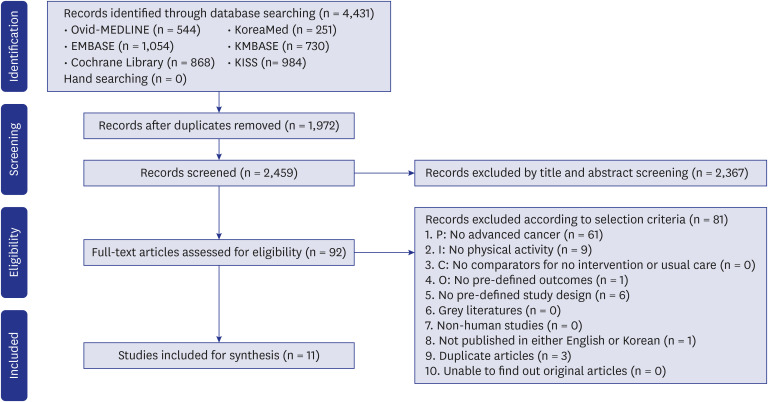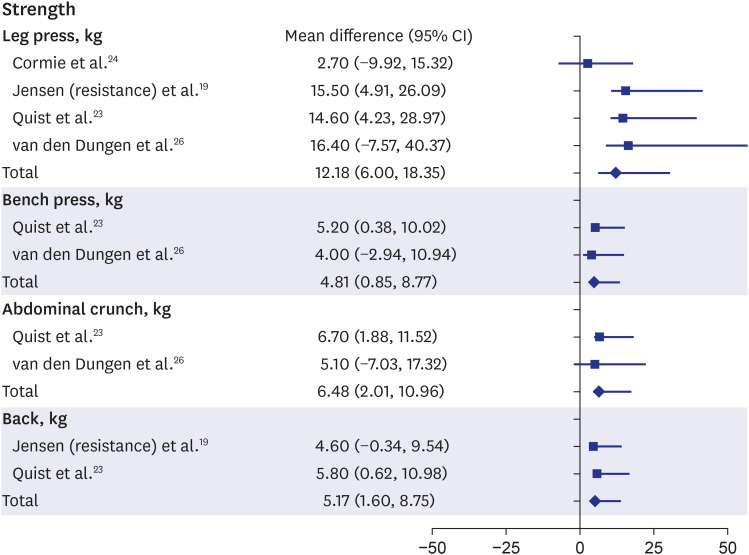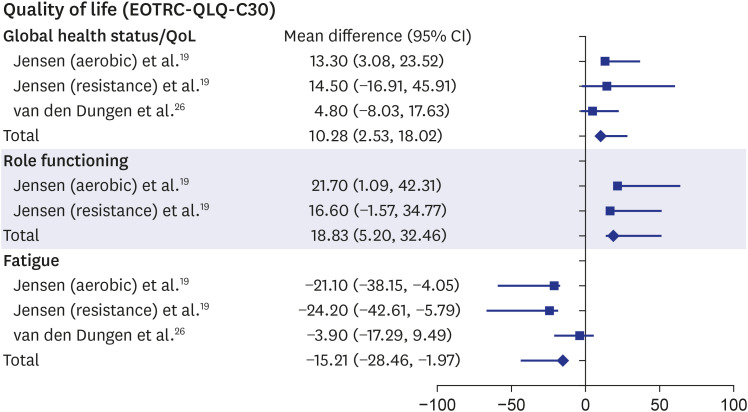J Korean Med Sci.
2020 Jul;35(29):e242. 10.3346/jkms.2020.35.e242.
Supervised Physical Rehabilitation in the Treatment of Patients with Advanced Cancer: a Systematic Review and Meta-analysis
- Affiliations
-
- 1National Evidence-based Healthcare Collaborating Agency, Seoul, Korea
- 2Department of Physical Medicine and Rehabilitation, National Cancer Center, Goyang, Korea
- 3Department of Rehabilitation Medicine, Seoul National University Bundang Hospital, Seongnam, Korea
- KMID: 2504702
- DOI: http://doi.org/10.3346/jkms.2020.35.e242
Abstract
- Background
As the survival rate of cancer patients increases, the clinical importance of rehabilitation provided by healthcare professionals also increases. However, the evidence supporting the relevance of rehabilitation programs is insufficient. This study aimed to review the literature on effectiveness in physical function, quality of life (QOL) or fatigue of supervised physical rehabilitation in patients with advanced cancer.
Methods
A systematic review and meta-analysis was conducted following the Cochrane guidelines. We narratively described the results when meta-analysis was not applicable or appropriate. Literature databases including Ovid-MEDLINE, Ovid-EMBASE, and the Cochrane Library, as well as several Korean domestic databases, were searched up to June 2017 for studies that investigated the effectiveness of supervised physical rehabilitation programs on physical function, QOL or fatigue in patients with advanced cancer. The quality of the selected studies was evaluated independently by paired reviewers.
Results
Eleven studies with 922 participants were finally selected among 2,459 articles. The meta-analysis revealed that after physical exercise, the physical activity level and strength of patients with advanced cancer increased significantly. The QOL showed a statistically significant improvement after physical rehabilitation according to the European Organization for Research and Treatment of Cancer version C30. Though some of measurements about cardiovascular endurance or strength in several studies were not able to be synthesized, each study reported that they were significantly improved after receiving rehabilitation.
Conclusion
Supervised physical rehabilitation for patients with advanced cancer is effective in improving physical activity, strength, and QOL. However, more trials are needed to prove the effectiveness of supervised exercise and to strengthen the evidence.
Keyword
Figure
Cited by 1 articles
-
Underutilisation of Physical Rehabilitation Therapy by Cancer Patients in Korea: a Population-based Study of 958,928 Korean Cancer Patients
Songhee Cho, Seung Hyun Chung, Minjoo Kang, Aejeong Jo, Sung Hoon Sim, Yu Jung Kim, Eun Joo Yang
J Korean Med Sci. 2021;36(46):e304. doi: 10.3346/jkms.2021.36.e304.
Reference
-
1. Silver JK, Raj VS, Fu JB, Wisotzky EM, Smith SR, Kirch RA. Cancer rehabilitation and palliative care: critical components in the delivery of high-quality oncology services. Support Care Cancer. 2015; 23(12):3633–3643. PMID: 26314705.
Article2. Albrecht TA, Taylor AG. Physical activity in patients with advanced-stage cancer: a systematic review of the literature. Clin J Oncol Nurs. 2012; 16(3):293–300. PMID: 22641322.
Article3. Cromes GF Jr. Implementation of interdisciplinary cancer rehabilitation. Rehabil Couns Bull. 1978; 21(3):230–237.4. Okamura H. Importance of rehabilitation in cancer treatment and palliative medicine. Jpn J Clin Oncol. 2011; 41(6):733–738. PMID: 21622762.
Article5. Council IM, Sciences CL, Medicine I, Board NC, Simone JV, Hewitt M. Ensuring Quality Cancer Care. Washington, D.C.: National Academies Press;1999.6. Spence RR, Heesch KC, Brown WJ. Exercise and cancer rehabilitation: a systematic review. Cancer Treat Rev. 2010; 36(2):185–194. PMID: 19962830.
Article7. Fong DY, Ho JW, Hui BP, Lee AM, Macfarlane DJ, Leung SS, et al. Physical activity for cancer survivors: meta-analysis of randomised controlled trials. BMJ. 2012; 344:e70. PMID: 22294757.
Article8. Segal R, Zwaal C, Green E, Tomasone JR, Loblaw A, Petrella T, et al. Exercise for people with cancer: a clinical practice guideline. Curr Oncol. 2017; 24(1):40–46. PMID: 28270724.
Article9. Buffart LM, Kalter J, Sweegers MG, Courneya KS, Newton RU, Aaronson NK, et al. Effects and moderators of exercise on quality of life and physical function in patients with cancer: an individual patient data meta-analysis of 34 RCTs. Cancer Treat Rev. 2017; 52:91–104. PMID: 28006694.10. Stout NL, Baima J, Swisher AK, Winters-Stone KM, Welsh J. A systematic review of exercise systematic reviews in the cancer literature (2005–2017). PM R. 2017; 9:S347–84. PMID: 28942909.
Article11. Higgins J, Green S. Cochrane Handbook for Systematic Reviews of Interventions Version 5.1.0. London: The Cochrane Collaboration;2011.12. Moher D, Liberati A, Tetzlaff J, Altman DG; PRISMA Group. Preferred reporting items for systematic reviews and meta-analyses: the PRISMA statement. Ann Intern Med. 2009; 151(4):264–269. PMID: 19622511.
Article13. National Institute for Health and Care Excellence. Methods for the Development of NICE Public Health Guidance. London: NICE;2006.14. Health Insurance Review & Assessment Service. HIRA's Guideline for Undertaking Systematic Reviews. Seoul: HIRA;2013.15. Jastrzębski D, Maksymiak M, Kostorz S, Bezubka B, Osmanska I, Młynczak T, et al. Pulmonary rehabilitation in advanced lung cancer patients during chemotherapy. In : Pokorski M, editor. Respiratory Health. Advances in Experimental Medicine and Biology, Vol. 861. 2015. p. 57–64.16. Rief H, Welzel T, Omlor G, Akbar M, Bruckner T, Rieken S, et al. Pain response of resistance training of the paravertebral musculature under radiotherapy in patients with spinal bone metastases--a randomized trial. BMC Cancer. 2014; 14:485. PMID: 24996223.
Article17. Cormie P, Newton RU, Spry N, Joseph D, Taaffe DR, Galvão DA. Safety and efficacy of resistance exercise in prostate cancer patients with bone metastases. Prostate Cancer Prostatic Dis. 2013; 16(4):328–335. PMID: 23917308.
Article18. Oldervoll LM, Loge JH, Lydersen S, Paltiel H, Asp MB, Nygaard UV, et al. Physical exercise for cancer patients with advanced disease: a randomized controlled trial. Oncologist. 2011; 16(11):1649–1657. PMID: 21948693.
Article19. Jensen W, Baumann FT, Stein A, Bloch W, Bokemeyer C, de Wit M, et al. Exercise training in patients with advanced gastrointestinal cancer undergoing palliative chemotherapy: a pilot study. Support Care Cancer. 2014; 22(7):1797–1806. PMID: 24531742.
Article20. Litterini AJ, Fieler VK, Cavanaugh JT, Lee JQ. Differential effects of cardiovascular and resistance exercise on functional mobility in individuals with advanced cancer: a randomized trial. Arch Phys Med Rehabil. 2013; 94(12):2329–2335. PMID: 23810356.21. Loughney L, West MA, Dimitrov BD, Kemp GJ, Grocott MP, Jack S. Physical activity levels in locally advanced rectal cancer patients following neoadjuvant chemoradiotherapy and an exercise training programme before surgery: a pilot study. Perioper Med (Lond). 2017; 6:3. PMID: 28228938.
Article22. Beydoun N, Bucci JA, Chin YS, Spry N, Newton R, Galvão DA. Prospective study of exercise intervention in prostate cancer patients on androgen deprivation therapy. J Med Imaging Radiat Oncol. 2014; 58(3):369–376. PMID: 24118798.
Article23. Quist M, Adamsen L, Rørth M, Laursen JH, Christensen KB, Langer SW. The impact of a multidimensional exercise intervention on physical and functional capacity, anxiety, and depression in patients with advanced-stage lung cancer undergoing chemotherapy. Integr Cancer Ther. 2015; 14(4):341–349. PMID: 25800229.
Article24. Cormie P, Galvão DA, Spry N, Joseph D, Taaffe DR, Newton RU. Functional benefits are sustained after a program of supervised resistance exercise in cancer patients with bone metastases: longitudinal results of a pilot study. Support Care Cancer. 2014; 22(6):1537–1548. PMID: 24424484.
Article25. Park J, Lee Y, Seo H, Jang B, Son H, Kim S, et al. Risk of Bias Assessment Tool for Non-randomized Studies (RoBANS): Development and Validation of a New Instrument. In : 19th Cochrane Colloquium; 2011 Oct 19–22; Madrid. London: Cochrane;2011.26. van den Dungen IA, Verhagen CA, van der Graaf WT, van den Berg JP, Vissers KC, Engels Y. Feasibility and impact of a physical exercise program in patients with advanced cancer: a pilot study. J Palliat Med. 2014; 17(10):1091–1098. PMID: 25003635.
Article27. Heywood R, McCarthy AL, Skinner TL. Efficacy of exercise interventions in patients with advanced cancer: a systematic review. Arch Phys Med Rehabil. 2018; 99(12):2595–2620. PMID: 29738745.
Article28. Dittus KL, Gramling RE, Ades PA. Exercise interventions for individuals with advanced cancer: a systematic review. Prev Med. 2017; 104:124–132. PMID: 28716654.
Article29. Mustian KM, Alfano CM, Heckler C, Kleckner AS, Kleckner IR, Leach CR, et al. Comparison of pharmaceutical, psychological, and exercise treatments for cancer-related fatigue: a meta-analysis. JAMA Oncol. 2017; 3(7):961–968. PMID: 28253393.30. Parry C, Kent EE, Mariotto AB, Alfano CM, Rowland JH. Cancer survivors: a booming population. Cancer Epidemiol Biomarkers Prev. 2011; 20(10):1996–2005. PMID: 21980007.
Article31. Daher M. Ethical issues in the geriatric patient with advanced cancer ‘living to the end’. Ann Oncol. 2013; 24(Suppl 7):vii55–vii58. PMID: 24001765.
Article32. Spence RR, Heesch KC, Brown WJ. A systematic review of the association between physical activity and colorectal cancer risk. Scand J Med Sci Sports. 2009; 19(6):764–781. PMID: 19705997.
Article33. Peddle-McIntyre CJ, Singh F, Thomas R, Newton RU, Galvão DA, Cavalheri V. Exercise training for advanced lung cancer. Cochrane Database Syst Rev. 2019; 2:CD012685. PMID: 30741408.
Article34. McNeely ML, Campbell KL, Rowe BH, Klassen TP, Mackey JR, Courneya KS. Effects of exercise on breast cancer patients and survivors: a systematic review and meta-analysis. CMAJ. 2006; 175(1):34–41. PMID: 16818906.
Article35. Lowe SS, Tan M, Faily J, Watanabe SM, Courneya KS. Physical activity in advanced cancer patients: a systematic review protocol. Syst Rev. 2016; 5:43. PMID: 26968701.
Article
- Full Text Links
- Actions
-
Cited
- CITED
-
- Close
- Share
- Similar articles
-
- The Impact of Mental Practice on Motor Function in Patients With Stroke: A Systematic Review and Meta-analysis
- An Introduction of the Systematic Review and Meta-Analysis
- How to review and assess a systematic review and meta-analysis article: a methodological study (secondary publication)
- The Rehabilitation-Related Effects on the Fear, Pain, and Disability of Patients With Lumbar Fusion Surgery: A Systematic Review and Meta-Analysis
- Critical Appraisal of Systematic Review/Meta-analysis





